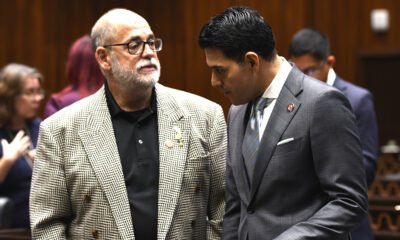Biden-Harris administration
Is America Entering a New Era of Government Reform?

By Dr. Thomas Patterson |
The landscape of American governance is being challenged by growing discontent among proponents of limited government. Over the past two decades, government spending has surged, overshadowing stable revenue growth, resulting in a staggering gross federal debt of $36 trillion.
Amid these financial challenges, the Biden/Harris administration’s approach has been to amplify spending, a move viewed by critics as short-sighted. In what many consider an era of relative peace, the administration has prioritized political expediency over fiscal responsibility.
Looking ahead, speculation surrounds the potential for a shift under a new administration. A focal point for reform could be the Department of Education (DOE), which has faced criticism for its inefficacy since its inception in the 1970s. Despite receiving billions in funding, the DOE’s efforts to enhance academic performance in government schools appear to have fallen short, with little to show for its expansive budget.
Historical initiatives like Goals 2000 and No Child Left Behind have failed to yield significant improvements in educational outcomes. Instead, the DOE seems to have perpetuated a cycle of bureaucratic employment at the expense of genuine progress in American education.
Moreover, the DOE’s alliance with teachers’ unions has sparked criticism, particularly during the COVID-19 pandemic, which exposed the vulnerabilities of union-led public schools. In contrast, many private institutions adapted more effectively, minimizing disruption to their students’ education.
The struggle to eliminate the DOE echoes past advocacy from leaders like Ronald Reagan, who called for its dismantlement. Returning control of education policy to the states could potentially rectify long-standing issues, fostering a more effective educational environment for future generations.
Similarly, the Department of Housing and Urban Development (HUD) has faced scrutiny since its establishment in 1964. The homeownership rate, remaining stagnant at 64%, calls into question the efficacy of HUD’s interventions. Despite numerous federal housing programs aimed at increasing accessibility, home prices have escalated dramatically, making homeownership increasingly unattainable for many Americans.
In the last six decades, HUD has expended around $4 trillion with minimal impact, leading to arguments that the housing market might function better without federal interference.
This trend of expanding bureaucracies aligns with a broader shift toward centralized governance in the United States. Citizens often find their taxes redistributed by Washington bureaucrats, leading to services that come with numerous conditions and limitations.
Reforming or eliminating entrenched bureaucracies presents undeniable challenges. However, the current political climate may offer a unique opportunity to reassess and restructure government functions. A strategic approach to curtailing excessive government spending and restoring economic stability could lay the groundwork for a more prosperous future.
Dr. Thomas Patterson, former Chairman of the Goldwater Institute, is a retired emergency physician and served as an Arizona State senator for a decade. He authored Arizona’s original charter schools bill.


















